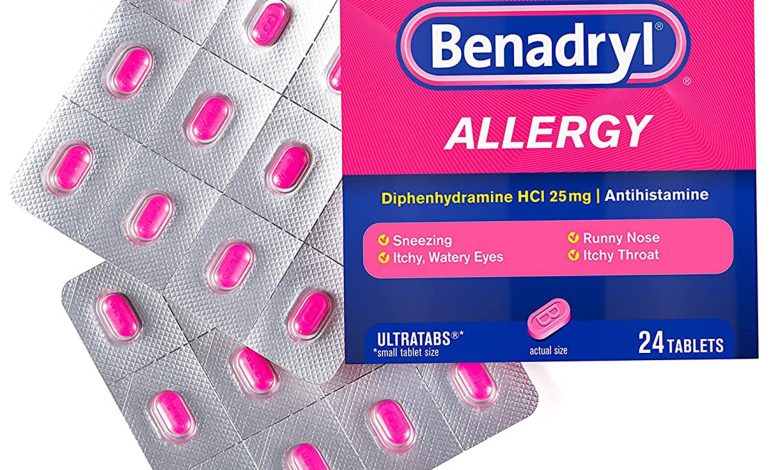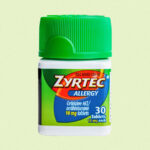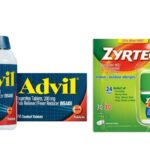I Accidentally Took Benadryl And Zyrtec

According to the CDC, Nearly 841,000 people have died from drug overdose in the last twenty years. In a single year, 70,630 drug overdose deaths occurred in the United States.
The most common error people make with their medicines is taking – or giving – a double dose. Or, someone gets distracted and takes a prescription medicine once – and then again. For some medicines, an extra dose can cause problems.
What is Zyrtec?
Zyrtec is a brand of cetirizine, a second-generation oral antihistamine that reduces the effects of the natural chemical histamine in the body. Histamine can produce symptoms of sneezing, itching, watery eyes, and a runny nose.
Zyrtec is used in adults and children to treat cold or allergy symptoms such as sneezing, itching, watery eyes, or runny nose. Zyrtec is also used to treat itching and swelling caused by chronic urticaria (hives).
Other common OTC brands with cetirizine as the main active ingredient include:
• Aller-Tec
• Alleroff
• Zyrtec-D
• Wal Zyr-D
• Cetiri-D
What is Benadryl?
Benadryl contains diphenhydramine, a first-generation antihistamine used to relieve symptoms of allergy, hay fever, and the common cold. These symptoms include rash, itching, watery eyes, itchy eyes/nose/throat, cough, runny nose, and sneezing.
Benadryl is also used to prevent and treat nausea, vomiting and dizziness caused by motion sickness. Diphenhydramine can also be used to help you relax and fall asleep. This medication works by blocking a certain natural substance (histamine) that your body makes during an allergic reaction. Its drying effects on such symptoms as watery eyes and runny nose are caused by blocking another natural substance made by your body (acetylcholine).
Other common OTC brands that include the antihistamine diphenhydramine include:
• Banophen
• Siladryl
• Unisom
• Benadryl-D Allergy Plus Sinus
• Robitussin Severe Multi-Symptom Cough Cold + Flu Nighttime
• Sudafed PE Day/Night Sinus Congestion
What will happen If I accidentally took Benadryl and Zyrtec together?
Accidentally taking Benadryl and Zyrtec together can lead to antihistamine poisoning due to overdose. Symptoms include dizziness, tachycardia, headache drowsiness, or agitation. In addition, taking Benadryl and Zyrtec together can have a negative effect on QT interval due to the overdose effects.
Benadryl and Zyrtec or other popular over-the-counter oral antihistamine brands should never be taken together because when combined, these medicines will not work well to relieve your symptoms. They work better to control your symptoms if you take them alone as recommended.
What are the side effects of antihistamines?
You and your healthcare provider should discuss specific antihistamines and decide together if the potential benefits of an antihistamine outweigh its potential side effects.
Some of the common side effects of first-generation antihistamines include:
• Drowsiness.
• Dry mouth, dry eyes.
• Blurred or double vision.
• Dizziness and headache.
• Low blood pressure.
• Mucous thickening in the airways.
• Rapid heart rate.
• Difficulty urinating and constipation.
Some of the common side effects of second-generation antihistamines include:
• Headache.
• Cough.
• Tiredness.
• Sore throat.
• Abdominal pain or discomfort
• Nausea or vomiting.
Common side effects of H-2 antihistamines include:
• Drowsiness.
• Joint or muscle pain.
• Headache.
• Confusion in the elderly.
• Dizziness.
• Breast swelling and tenderness.
In what dosage forms are antihistamines available?
Antihistamines come in several forms including:
• Liquids.
• Lotions.
• Syrups.
• Gels.
• Eye drops.
• Tablets.
• Nasal sprays.
• Creams.
• Capsules.
• Suppositories.
How do I know which antihistamine to take?
Because there are so many antihistamine products, both over-the-counter and prescription, and because they are used to treat so many different conditions, you may need help figuring out which medication to take. For minor ailments, you can probably take over-the-counter products. You can read the package labeling and match your symptoms to the labeled symptoms. Also, never hesitate to ask the pharmacist. They are highly schooled in the actions and effects and side effects of drugs. You may need to try different antihistamines (but no more than one at a time unless directed by your physician) to find the best medication to manage your symptoms.
If you need a prescription antihistamine, you and your healthcare provider will work together to figure out what medication will be best for you. Many drugs interact with antihistamines, so your healthcare provider will want to know what medical conditions you have and the medications you are currently taking. They will also want to know if you are pregnant, plan to become pregnant, or are breastfeeding. Some antihistamines are not recommended in pregnancy because they may cause birth defects in very high doses. Antihistamines can pass into breast milk, so you should consult with your healthcare provider before using antihistamines if you are breastfeeding.
Children and the elderly are more sensitive to the effects of antihistamines, so special consideration will be given to the use of these products in these patients. Never give over-the-counter cough and cold antihistamines to children under four years of age. These medications can cause life-threatening side effects.





